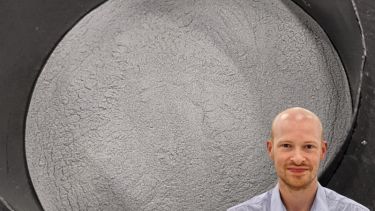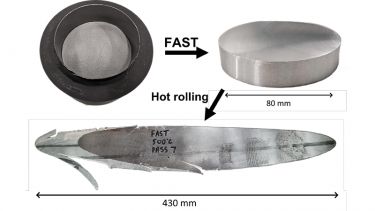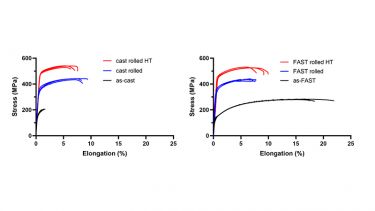A project led by Dr Simon Graham, Research Associate, EPSRC MAPP - Future Manufacturing Hub; and supported by Prof. Martin Jackson, Research Area Lead, Royce at the University of Sheffield; Dr Beatriz Fernández Silva, Research Associate, STAR Group; Dr Oliver Levano Blanch, STAR Group; Nigel Adams, Senior Engineering Technician, Royce at the University of Sheffield; Sam Lister, AMS CDT EngD Researcher; and Dr William Pulfrey, AMP Engineering Lead (Thermomechanical Processing), Royce at the University of Sheffield; combines Field Assisted Sintering Technology [FAST] with hot rolling to convert surplus aluminium alloy powders from atomisation into sheet material in two solid-state steps.
The research is in collaboration with an industry partner, ECKART GmbH, who provided the A20X alloy powder used in this project.
[Dr Beatriz Fernandez Silva is a member of our 2016 Cohort; Dr Simon Graham and Dr Oliver Levano Blanch are members of our 2017 Cohort.]
Context
Metal additive manufacturing [AM] techniques typically operate using powders with limited particle size ranges. In the atomisation process [where the melted metal alloys are first refined and degassed, then poured into a gas nozzle, where the liquid material is disintegrated into metal powder by a high-pressure gas stream], significant amounts of particles are produced outside of these ranges. This results in an accumulation of out-of-size specification metal powders without a clear use case, in addition to many other sintering methods having been found to be ineffective in the consolidation of aluminium powders.
AM techniques are generally promoted as having reduced material wastage compared to conventional metallurgy, where extensive machining waste is generated, but the as-atomised particle size range is often overlooked as an issue. Business economics requires that alternative processes are utilised to convert these surplus powders into useful products, to ensure that the AM market is cost effective and meets sustainability targets. This key factor informs the foundation of this research.
Field Assisted Sintering Technology [FAST] can provide an alternative solid-state processing route to consolidate these surplus powders into billets for subsequent processing. This enables the production of useful products from this feedstock, whilst also improving sustainability within the AM supply chain.
This project goes a step further, in combining FAST with hot rolling, to convert surplus aluminium alloy powders from atomisation into sheet material in two solid-state steps. FAST can effectively consolidate the powder into fully dense billets, which are then hot rolled into sheets.
Through tensile testing, the results revealed that the properties’ output from this process were comparable to conventional material which is used in aerospace applications.
Underpinning Research
Pre-existing research, focussed on FAST of metal powders, has assisted in the development of this project. This spurred a final year student project [designed by Dr Graham], led by Alicia Patel, BEng Aerospace Engineering student, who assisted in the practical work in the early-stage development of research direction prior to defining this project. Following the completion of this early-stage research, the project has been built upon with a more streamlined direction, which was led by Dr Simon Graham.
The works have also been informed by works carried out in Sheffield, relating to the processing of titanium powders which are oversized for laser powder bed fusion, where methods of crossover were identified to be of relevance. When reviewing existing literature, only one paper has been published which specialises on hot rolled, FAST produced, pure aluminium. Previously published research on A20X alloy has only considered AM or cast material.
Current Findings
It has been shown that FAST can rapidly consolidate aluminium alloy powders, including A20X, with a large particle size range into fully dense materials. The resulting 80mm diameter A20X FAST were also successfully hot rolled from their initial 15mm thickness down to 2mm sheet, although some later optimisation is required to prevent edge defects within the sheet.
Some conventional cast A20X material - with the same starting dimensions - were also hot rolled under the same conditions. Tensile testing showed that - before and after the heat treatment - the FAST material exhibited similar properties to the cast and were comparable to other aluminium sheet used in aerospace applications.
These findings were presented by Dr Simon Graham at WorldPM 2022 Conference [sponsored by the European Powder Metallurgy Association], in a keynote titled: ‘Solid-State Processing of Surplus Aluminium Alloy Powders through a Combination of Field Assisted Sintering Technology and Hot Rolling’.
The results were a promising step in creating high performance sheet material from surplus aluminium alloy powders, with some further optimisation and scale up required.
Impact
The outcome of this project has demonstrated that there is a viable processing route to convert surplus alloy powders into sheet material with good mechanical properties. Although the long-term, positive, impacts cannot be quantified at this stage, there are clear economic impacts. These economic benefits relate to new revenue streams for atomisers, as well as a potential cost reduction of powders for AM.
The next steps involve completing further rolling trials, to optimise the processing, and produce higher quality of sheet product. These sheets can also be extended in the starting phases, in a bid to produce larger sheets as an output, which further demonstrates scale up opportunities. Superplastic forming of the sheet material could also be considered to produce near-net shape components.
Equipment and Facilities
FCT HP D 25, Royce Discovery Centre, Royce at the University of Sheffield
FCT HP D 250/C, Royce Discovery Centre, Royce at the University of Sheffield
Fenn Rolling Mill, Royce Discovery Centre, Royce at the University of Sheffield
JEOL JSM-7900F SEM, Sorby Centre for Electron Microscopy, Kroto Research Institute




